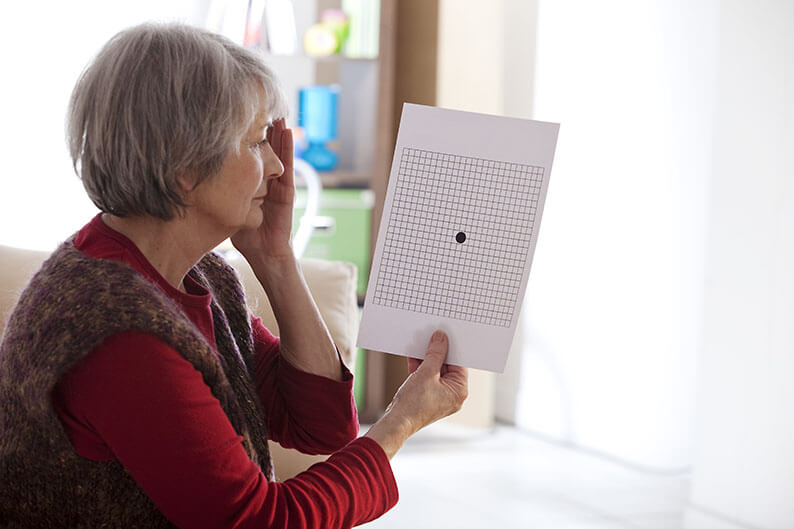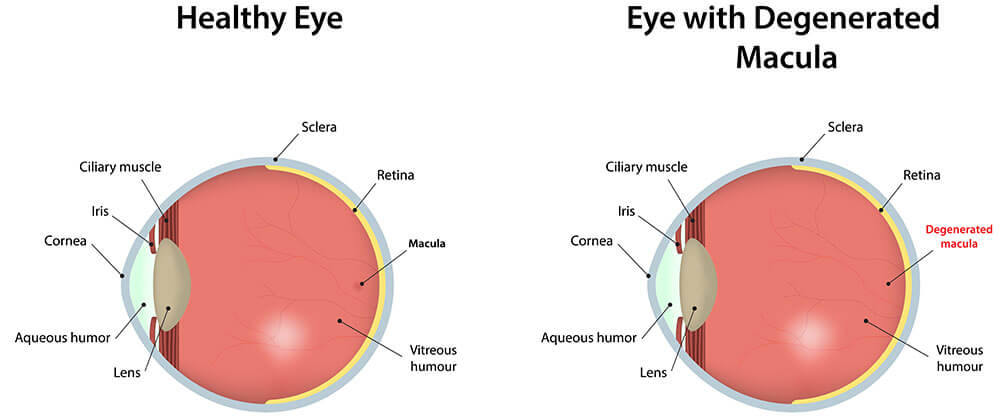Macular Degeneration
Macular degeneration is the leading cause of impaired reading or detailed vision. It is caused by the breakdown of the macula, the central portion of the retina. Although macular degeneration causes distortion of central and color vision, side vision is not affected.
What is the retina?
The retina is a thin layer of light sensitive tissue which lines the back of the eye. When light enters the eye, it is focused by the cornea and the lens onto the retina. The retina then transforms the light images into electrical impulses which are sent to the brain through the optic nerve.
What is the macula?
The macula is a very small area of the retina which is responsible for central vision and color vision. The macula allows us to read, drive, and perform detailed work. Surrounding the macula is the peripheral retina which is responsible for side vision and night vision.
What causes macular degeneration?
Macular degeneration is most commonly a natural result of the aging process. With time, the retinal tissues break down and become thin. This deterioration causes a loss of function of the macula. In about 10% of cases of macular degeneration, aging of the retina is compounded by leakage of the tiny blood vessels which nourish the retina. Growth of new, abnormal blood vessels in the scar tissue that forms from the leaking blood vessels is also common. Blood and leaking fluid destroy the macula, causing vision to become distorted and blurred. The formation of dense scar tissue blocks out central vision to a severe degree. Occasionally, macular degeneration is caused by injury, infection, or inflammation. The disease may also be hereditary.
What are the symptoms of macular degeneration?
The most notable symptom of macular degeneration is blurry or distorted vision. Difficulty in reading, doing work, or driving may also be noticed. A person with macular degeneration may experience blurry words or a distortion of the center of a scene, an empty area in the center of vision, or the distortion of lines. Macular degeneration may also cause dimming of color vision. Fortunately, the disease does not cause total blindness as side vision is not affected. Macular degeneration only affects central and vision. However, if macular degeneration occurs in only one eye, the symptoms of the disease may not be noticed, as the “good” eye compensates for the “bad” eye.
How is macular degeneration diagnosed?
A lighted instrument called an ophthalmoscope is used to examine the retina. In addition, some special tests may be administered. The Amsler grid test, in which the patient looks at a page similar to graph paper, is used to detect blind spots or distortion of central vision. A color vision test will indicate damage to the macula if the patient cannot detect symbols or letters camouflaged in colored patterns. If macular degeneration is detected, a procedure called fluorescein angiography may be done to check for blood vessel leakage, a dye, which quickly travels to the eye, is injected into the patient’s arm. Photographs of the blood vessels in the retina are then taken to determine the extent of damage.
How is macular degeneration treated?
Unfortunately, there is no cure for macular degeneration. However, laser treatment may be used to slow the progression of the disease. Laser treatment can also be effective in sealing leaky blood vessels and destroying abnormal vessels so that hemorrhaging and scarring will not decrease central vision.
Low vision aids
People who suffer from macular degeneration are able to compensate for much of their vision loss through the use of low vision aids. Magnifying glasses and stand-magnifiers are available from craft/hobby retailers and medical supply stores. Bright illumination for reading and other close work can also be helpful. Try to position yourself close to a bright lamp or reading light. If you’re a reader, be sure to look for large print books, magazines, and newspapers. Electronic readers (Kindle, iPad, etc.) are great options, as well. The font can be enlarged to a very comfortable size, and the screen’s illumination makes it easier to see than pages of a print book. Additionally, most e-readers have a text-to-speech functionality that reads the book aloud to you (much like an audio book).
Prevention is the best medicine
Regular eye examinations are the only means of detecting macular degeneration, as the symptoms of the disease often go unnoticed. Early detection of macular degeneration may prevent further loss, since treatment is only effective when started early. Regular examinations are especially important for older adult persons who have family members with a history of retinal problems. If you are experiencing difficulty with central a vision or have other problems, you should obtain a complete eye examination.
AMD and nutritional supplements
Age-related macular degeneration (AMD) is a disease caused by damage to or breakdown of the macula, the small part of the eye’s retina that is responsible for our central vision. This condition affects both distance and near vision and can make some activities (like threading a needle or reading) very difficult or impossible. Macular degeneration is the leading cause of severe vision loss in people over 65.
Although the exact causes of AMD are not fully understood, a recent scientific study shows that antioxidant vitamins and zinc may reduce the impact of AMD in some people with the disease.
Among people at high risk for late-stage macular degeneration (those with intermediate AMD in both eyes or advanced AMD in one eye), a dietary supplement of vitamins C, E and beta carotene, along with zinc, lowered the risk of the disease progressing to advanced stages by about 25 to 30 percent. However, the supplements did not appear to benefit people with minimal AMD or those who have no evidence of macular degeneration.
Light may affect the eye by stimulating oxygen, leading to the production of highly reactive and damaging compounds called free radicals. Antioxidant vitamins (vitamins C and E and beta carotene) may work against this activated oxygen and help slow progress of macular degeneration.
Zinc, one of the most common minerals in our body, is very concentrated in the eye, particularly in the retina and macula. Zinc is necessary for the action of over 100 enzymes, including chemical reactions in the retina. Studies show some older people have low levels of zinc in their blood. Because zinc is important for the health of the macula, supplements of zinc in the diet may slow down the process of macular degeneration.
The levels of antioxidants and zinc that were shown to be effective in slowing AMD’s progression cannot be consumed through your diet alone. These vitamins and minerals are recommended in specific daily amounts as supplements to a healthy, balanced diet.
It is very important to remember that vitamin supplements are not a cure for AMD, nor will they restore vision you may have already lost from the disease. However, specific amounts of certain supplements do play a key role in helping some people at high risk for advanced AMD to maintain their vision. You should speak with your ophthalmologist to determine if you are at risk for developing advanced AMD, and to learn if supplements are recommended for you.







